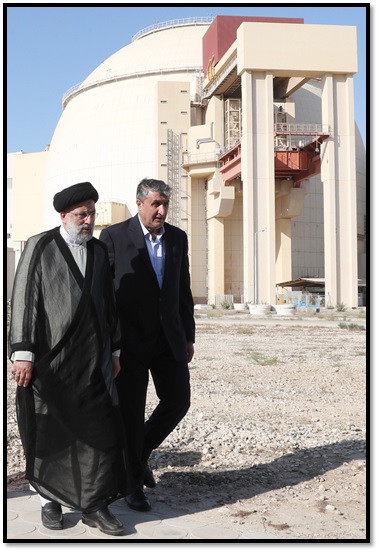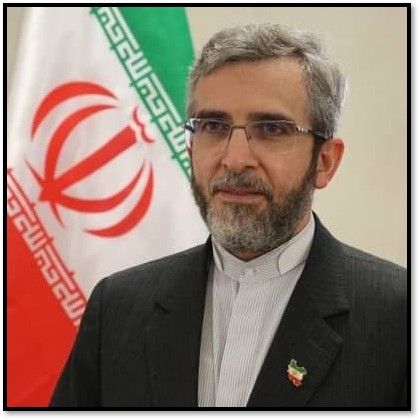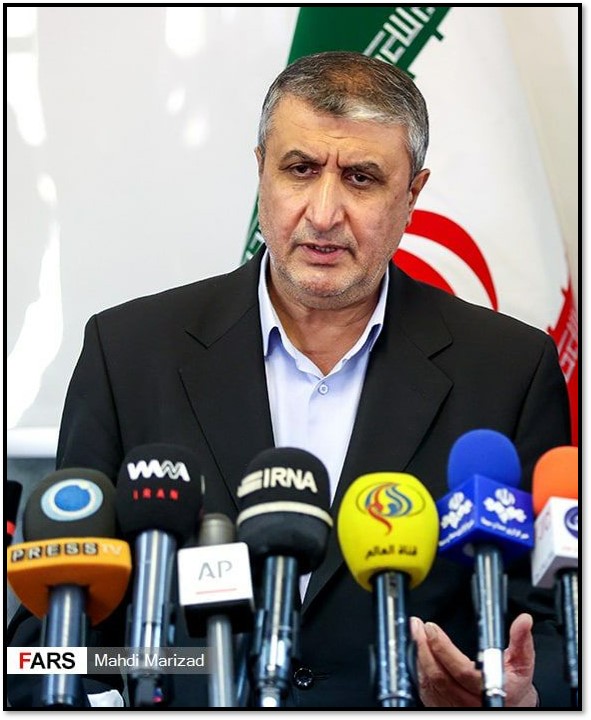The Raisi government’s two top officials on nuclear issues reflected Iran’s increasingly assertive stance on both diplomacy with the outworld and developing capabilities at home. Both are known as hardliners. Both have been deeply critical of the United States.

On August 29, Raisi appointed Mohammad Eslami as a vice president and chief of the Atomic Energy Organization of Iran (AEOI). Eslami, a civil engineer with extensive experience in the defense industry, replaced Ali Akbar Salehi, an MIT-educated nuclear engineer who played a key role in the negotiations that led to the 2015 nuclear deal.
Shortly after his appointment, Eslami demanded that the United States make the first move in returning to compliance with the nuclear deal, known as the Joint Comprehensive Plan of Action (JCPOA). JCPOA. “It is the time [for the United States] to rectify the wrong policies and initially remove all sanctions in a practical, effective and verifiable manner,” Eslami said. President Donald Trump withdrew from the deal in 2018 and reimposed wide-ranging economic sanctions.
On September 14, the new foreign minister, Hossein Amir-Abdollahian, appointed Ali Bagheri (also known as Ali Bagheri Kani) as deputy foreign minister for political affairs. Bagheri, a career diplomat with a background in economics, replaced Abbas Araghchi, the British-educated diplomat who helped negotiate the 2015 nuclear deal and led the Iranian team during the first six rounds of renewed diplomacy in 2021.
Bagheri has long been a vocal critic of the JCPOA. “The outcome of diplomacy with the U.S. was unmitigated damage,” he wrote in the introduction to a Persian-language translation of U.S. Deputy Secretary of State Wendy Sherman’s memoir, Not for the Faint of Heart (published in 2019).
The focus of negotiations must first be sanctions relief rather than Iran’s nuclear advances since it began breaching limits of the accord in 2019, according to Bagheri. “We do not have nuclear talks because the nuclear issue was fully agreed in 2015,” he told state media on November 10. “The main issue we are facing now is the consequences of the U.S. withdrawal from the JCPOA, which are limited to the illegal sanctions imposed on the Islamic Republic of Iran.” The following are brief profiles of Bagheri and Eslami.
Ali Bagheri

Born in 1967 in the Kan district of Tehran, Bagheri’s family has extensive revolutionary credentials. His father, Ayatollah Mohammad Bagher Bagheri Kani, was a disciple of Ayatollah Ruhollah Khomeini and participated in the 1979 Islamic revolution. He represented Tehran in the Assembly of Experts—more than 80 clerics and scholars who appoint and oversee the Supreme Leader—from 1983 to 1999 and from 2007 to 2016. Bagheri’s uncle, Ayatollah Mohammad Reza Mahdavi Kani, also studied under Khomeini and supported the revolution. He served in several senior positions, including as interior minister, interim prime minister, and chairman of the Assembly of Experts before his death in 2014. Finally, Bagheri’s brother, Mesbah al Hoda Bagheri Kani, married Supreme Leader Ayatollah Ali Khamenei’s daughter.
Bagheri received a doctorate in economics from Imam Sadegh University, a private school with several graduates who rose to senior government positions. Ayatollah Mahdavi Kani, Bagheri’s uncle, founded the university and served as its president.
After a brief stint at a state radio station, Bagheri joined the foreign ministry in 1994 in the Middle East and North Africa directorate. He worked on the Egypt, Jordan, Lebanon and Palestine portfolios. He was director general of Central and Northern European Affairs from 2005 to 2007. He was acting deputy of the Office for European Affairs from 2007 to 2008.
During the president of Mahmoud Ahmadinejad, Bagheri served as deputy secretary of the Supreme National Security Council (SNSC) under Saeed Jalili from 2008 to 2013. The SNSC is the most important body for deciding national security policies, although its actions must be approved by the Supreme Leader. While at the SNSC, Bagheri was a senior negotiator in nuclear talks world powers from 2009 to 2013.
Bagheri managed Jalili’s presidential campaign in 2013. Jalili, a hardliner, came in third place with 11 percent of the vote. Bagheri later served as an advisor at SNSC.
In 2019, Raisi, then the judiciary chief, appointed Bagheri to two senior positions—one on human rights and the other on international affairs related to the judiciary. Bagheri defended Iran’s record at international forums as secretary of the High Council for Human Rights.
After the June 2021 presidential election, then President-elect Raisi appointed Bagheri to manage foreign affairs on his transition team, including a review of the JCPOA. In September, Bagheri was appointed deputy foreign minister for political affairs. The following are quotes from Bagheri on key issues.
On the JCPOA and diplomacy:
- “Experience tells us that the West does not seek to implement a deal... From our perspective, the principle of 'mutual compliance' cannot form a proper base for negotiations since it was the US government which unilaterally left the deal.” (Nov. 28, 2021)
- “Until the violating and non-compliant party to the deal does not demonstrate, in practice, its commitment to the JCPOA, there is no reason for Iran to abandon its rights and entitlements guaranteed by the deal. Everything is clear and there is nothing ambiguous about the nuclear deal to negotiate. The U.S. and the E.U. must show that they have the political will to implement what they agreed to do in 2015. They must overcome domestic considerations to resolve this.” (Nov. 22, 2021)
- “The main purpose of these talks, in the Islamic Republic of Iran’s view, is the removal of the unlawful sanctions that the United States government imposed against the Iranian nation through its violating of the JCPOA and [U.N. Security Council] Resolution 2231.” (Nov. 13, 2021)
- “We need verification [of sanctions relief], and this remains unresolved. It is one of the issues that remains not finalized. It is not enough for the ink to be put on the agreement.” (Nov. 11, 2021)
- “There are serious doubts about the true will of the U.S. to fulfill its commitments [under the JCPOA].” (Oct. 14, 2021)
- “The JCPOA has a clear framework and other issues are not relevant. We are not going to negotiate on our defense capabilities or our security.… Iran’s relations with other countries did not need a guardian.” (Nov. 11, 2021)
- “Achieving tangible results is important for Iran, as Tehran is always ready for serious negotiations that result in a practical agreement and not merely a paper agreement.” (Oct. 14, 2021)
- “The outcome of diplomacy with the U.S. was a passage that in action denied Iran’s rights and shut down many of our nuclear activities. In addition, the deal stabilized the sanctions structure and maintained the economic sanctions.” (2019, in the introduction to a Persian-language translation of former U.S. Deputy Secretary of State Wendy Sherman’s memoir, Not for the Faint of Heart)
On the International Atomic Energy Agency:
- “As far as our nuclear activities are concerned, they are under the supervision of IAEA. All our nuclear activities currently are within the commitments towards NPT [Non-Proliferation Treaty] and also the additional protocol. And there is not any difference or violation. There is not any activity that is not being supervised by IAEA. Therefore, there should not be any concern about our nuclear activities. And the claims that are being made vis-a-vis this issue, they are of political nature.” (Nov. 11, 2021)
On the United States:
- “America is, indeed, the Great Satan…. The Europeans who talk about human rights should really feel a little bit ashamed of themselves for obeying the oppressive policy of the Americans. When everyone is dealing with this thing – with the coronavirus – they do not stop their illegal and inhumane thing [sanctions].” (March 18, 2020)
- “Just as we showed in the military arena that if any country – even America – acts against us, it must pay a price. One day its drone is shot down, another day its official base in another country is hit by the Islamic Republic’s missiles… In the legal arena, the political arena and every arena, we must act in a way that makes it so that they do not feel that they have a comfortable and open space where they can organize their actions against the Islamic Republic of Iran and the Iranian people.” (May 2020)
Trumpism in @JoeBiden administration is not limited to keeping Maximum Pressure sanctions against Iran or full support for Zionist regime; they continue to ignore international laws by preventing UNSC condemnation of "Israeli war crimes" in Gaza.#GazaUnderAttack
— علی باقریکنی (@Bagheri_Kani) May 19, 2021
On the Middle East:
- “Our view is that whenever foreigners, in any form, enter or infiltrate our region, because they pursue their own interests and policies, their presence would be against security and stability in the region. Regional countries, even if they have differences, are competent to sit down for talks so that they can resolve their differences. … In the region, in Iraq and Syria, we are and have been fighting terrorists alongside those countries’ legal governments and people. In Palestine, we stand by the Palestinian people against the occupiers. In Yemen, we are standing by its oppressed people in the face of aggressors.” (Nov. 13, 2021)
Mohammad Eslami

Born in 1956 in historic Isfahan, Eslami received a bachelor’s degree in civil engineering from University of Detroit (now University of Detroit Mercy) in 1979 and a master’s degree from the University of Toledo (Ohio) in 1981 in the same subject. He later received a master’s degree in global aviation management from the University of Sharif and Canada’s Royal Roads University in 2004, according to Iranian media.
From 1987 to 1995, Eslami oversaw the development of military equipment at the Defense Industries Organization, which is part of the Ministry of Defense and Armed Forces Logistics. From 1995 to 2003, he was managing director of the Iran Aviation Manufacturing Company. From 2004 to 2007, Eslami directed the Defense Industries Training and Research Institute. In 2008, the United Nations sanctioned Eslami for “being engaged in, directly associated with or providing support for Iran’s proliferation-sensitive nuclear activities or for the development of nuclear weapon delivery systems.” The 2015 nuclear deal lifted the sanctions.
Eslami served as the deputy defense minister for industry and research from 2007 to 2017. From 2017 to 2018, Eslami was governor of northern Manzandaran province, along the Caspian Sea. He then served as housing and transport minister under President Hassan Rouhani from 2018 until the fall of 2021.
In January 2020, Eslami initially denied reports that Iran shot down a Ukrainian passenger plane after it took off from Tehran’s international airport. “There are rumors that a terrorist attack, explosion or shooting at the plane may have caused the incident, but they are not true. Technical failure has been the cause of the incident,” he told local media. Three days after the incident, the Revolutionary Guards admitted that operators fired two missiles at the plane; they mistook it for an incoming cruise missile.
On Aug. 29, 2021, Raisi appointed Eslami to be a vice president as well as chief of the Atomic Energy Organization of Iran. He will be in charge of implementing plans to build two nuclear power plants under a contract with Russia. The following are quotes from Eslami on key issues.
On the JCPOA and the United States:
- “The Joint Comprehensive Plan of Action (JCPOA), which was concluded in order to remove the impediments of Iran’s progress, is a clear example of Iran’s goodwill which the United States not only violated with complete disregard, but also through its unilateral policies, violated provisions of the JCPOA and UNSC resolution 2231 and withdrew from the deal. The so-called ‘maximum pressure’ policy was doomed to fail, and the U.S. administration should abandon its addiction to unilateral sanctions and respect international law.” (Sept. 20, 2021)
- “One has to wonder to what extent a party that has re-sanctioned us, failed to meet its obligations, withdrawn from the deal, imposed sanctions even on those who are cooperating with us, has the right to demand additional monitoring inspections on our compliance with obligations.” (Oct. 3, 2021)
- “The main point is the effort by the arrogant [United States] to prevent our country from achieving advanced technology…. They resent any manifestation of our country's power of deterrence, and they do everything in a hyper-active way. We have absolutely no clandestine activity, and if us acquiring uranium metal makes them feel threatened – let them feel threatened.” (Oct. 9, 2021)
On nuclear weapons:
- “We reiterate our conviction that the main remedy for the existing threats emanating from nuclear weapons, lies within full and verifiable nuclear disarmament.... We believe, as a matter of principle, that the meaningful promotion of global and regional peace and stability hinges, inter alia, on disarmament alongside with strengthening of the non-proliferation regime.” (Sept. 20, 2021)
- “Iran will operate within the framework of the International Treaty (NPT), of which it is a member. Iran pledges not to develop or proliferate nuclear weapons. Iran is committed to the Treaty on the Non-Proliferation of Nuclear Weapons. Moreover, under the law of the Islamic Republic and the fatwa of Iran's supreme leader, the development of nuclear weapons is prohibited. Therefore, our nuclear program is exclusively peaceful, and we will enrich uranium in a way to avoid crossing the permissible level.” (Oct. 3, 2021)
On the IAEA:
- “Iran has always cooperated with the Agency, [but] at the same time, it is necessary that the IAEA avoids politicization and maintains its independence, impartiality and professionalism…. Regrettably, the inaction of the United Nations and the IAEA in dealing with terrorist acts against peaceful nuclear facilities has emboldened perpetrators to continue and even increase their blatant defiance of the most basic and fundamental principles of international law and the United Nations Charter.” (Sept. 20, 2021)
On the priorities for Iran’s nuclear program:
- “Iran is now facing an acute need for electricity. Therefore, we have set a goal to meet 50 percent of the country's demand for 10,000-16,000 MW of electricity by building new [nuclear] power plants with a combined capacity of 8,000 MW. This is currently the principal objective of the Atomic Energy Organization of Iran. The second priority of the organization is to develop the production of radiopharmaceuticals and the development of radiotracer generators. Today, these nuclear power products should be actively introduced in our country in medicine, industry, agriculture, and the environment.” (Oct. 3, 2021)
- “The important thing to us is to be able to demonstrate our national authority, by creating the potential and the power to convert materials, and by showing that the AEOI can produce all types of fuel. None of these processes are outside the legal framework that is defined in the [International Atomic Energy Agency] Safeguards. The AEOI is committed to abiding by those regulations and frameworks.” (Oct. 9, 2021)
On Iran’s air defenses and missiles:
- “We intend to reach the point where our aerial defense ability will be so efficient from the operational perspective that it will destroy and disrupt all the enemy’s military plans. Regarding anti-missile defense shields such as the Iron Dome [in Israel], it must be understood that these systems can give limited coverage, to a certain height and range, and therefore all these plans are just psychological warfare. They know full well that they are very vulnerable from the technical and operational perspective, and they cannot remain protected from a multi-missile attack by Iran’s accurate, destructive missiles.” (Aug. 27, 2012)
Garrett Nada, managing editor of The Iran Primer, assembled this report.
Photo Credits: Eslami by Mahdi Marizad for Fars News Agency (CC BY 4.0); Eslami by Mohammad Hassanzadeh for Tasnim News Agency (CC BY 4.0)
